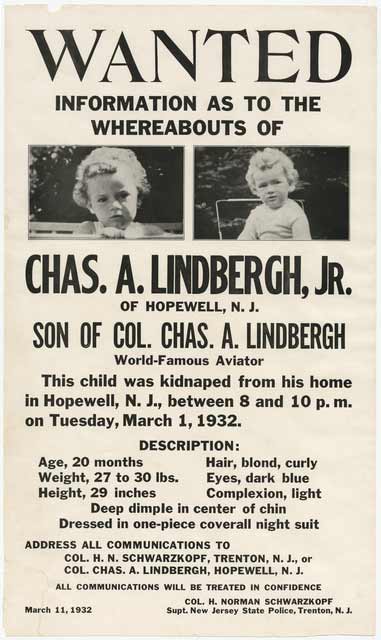Headline Kidnappings and the Origins of the Lindbergh Law has just been posted by
Barry Cushman, University of Virginia School of Law. It appeared in the St. Louis University Law Journal, Vol. 55, No. 4. Here's the abstract:
The federal kidnapping statute of 1932 -- which prohibits the transportation of a kidnapped person across state lines -- is commonly known as the Lindbergh Law due to its enactment in the immediate wake of the abduction of Charles and Anne Lindbergh’s child in March of that year. Indeed, but for the commission of that crime the statute probably would not have been enacted. But the Lindbergh affair alone cannot explain the form that the congressional reaction took. For the Lindbergh baby was found murdered fewer than four miles from his home, and there was no evidence that he had been transported across a state line. Had the Lindbergh Law been in effect when young Charles Lindbergh was kidnapped, it would not have applied to the offense. In fact, the bill that ultimately became the Lindbergh law was not introduced in the wake of that sensational crime, nor was it introduced by members of the New Jersey delegation that represented the Lindbergh family and the state in which the crime had been committed. Instead it had been introduced three months before the Lindbergh abduction by Senator Roscoe Conkling Patterson of Missouri and Representative John Joseph Cochrane of St. Louis.
The congressional hearing on the bill, which took place a week before the Lindbergh kidnapping, was dominated by testimony of officials from St. Louis. Owing to its strategic location on the state border with Illinois, that city had become a center of profitable activity for the organized criminals running the midwestern "snatch racket." This essay, prepared as a comment on Professor Lawrence Friedman’s Childress Lecture on "headline trials" at St. Louis University School of Law, explores the high-profile abductions of the early 1930s that spurred St. Louis leaders to seek federal legislation to address the scourge. These included kidnappings of scions of the Anheuser-Busch and International Shoe fortunes; but the story that dominated headlines and riveted the attention of the community for much of the decade involved the 1931 interstate abduction of the city’s leading otolaryngologist by a group of mobsters and ex-convicts led by a prominent St. Louis socialite named Nellie Muench. Nellie, whose underworld nickname was "Goldie" due to her exceptional interest in lucre, was married to a local physician, was the daughter of a well-known Baptist minister, and was the sister of a judge on the Missouri Supreme Court. The saga of Nellie and her partners in crime involved a parade of colorful figures participating in multiple criminal trials; the drive-by machine-gunning of a key witness; a near-fatal attack on the chief prosecutor; a faked pregnancy and two illegal adoptions (one of which resulted in an infant’s death) in order to curry favor with her criminal jury; an unsuccessful attempt to retain custody of the surviving child in a hearing before Special Commissioner Rush Limbaugh, Sr.; and ultimately a mail fraud conviction for seeking to extort $250,000 from the bachelor with whom she had initiated an affair and had told that he was the father of her child.
